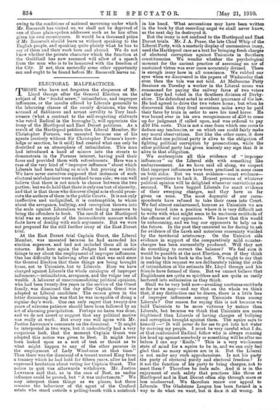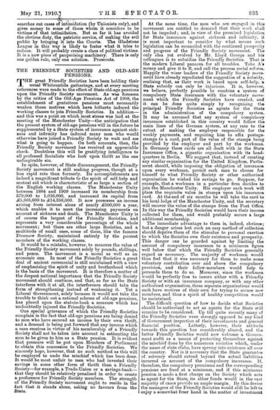ELECTORAL MA LPRACTICES.
THOSE who have not forgotten the eloquence of Mr. Lloyd George after the General Election on the subject of the " feudal screw," intimidation, and improper influences, or the insults offered by Liberals generally to the labouring classes of the county divisions, who were accused of flabbiness and arrant servility to Tory land- owners (what a contrast to the self-respecting stalwarts who voted Radical in the boroughs !), will appreciate the irony of the Hartlepool and East Dorset petitions. As a result of the Hartlepool petition the Liberal Member, Sir Christopher Furness, was unseated because one of his agents (entirely without Sir Christopher Furness's know- ledge or sanction, be it said) had created what can only be described as an atmosphere of intimidation. This man had introduced a band of miners into the streets to demonstrate in the Furness interest, having paid their fares and provided them with refreshments. Here was a case of the very kind of " improper influence " about which Liberals had been talking so much but proving so little. We have never ourselves supposed that instances of such electoral misbehaviour were confined to one side; we can well believe that there is not much to choose between the two parties; butwe do hold that there is only one test of sincerity, and that is that those who discover illegal acts should prose- cute the authors of them in the public Courts. It is not only ineffective and undignified, it is contemptible, to whine about the arrogance, bullying, and corruption thrown into the scale against Liberalism without taking measures to bring the offenders to book. The result of the Hartlepool trial was an example of the inconsiderate manner which facts have of dealing with such arguments. But we were not prepared for the still further irony of the East Dorset trial.
At the East Dorset trial Captain Guest, the Liberal Member, was unseated because he had exceeded his election expenses, and had not included them all in his returns. But here again the Judges had some caustic things to say about the employment of improper influences. One has difficulty in believing after all that was said since the General Election that these things are being brought home, not to Unionists, but to Liberals. Here we have charged against Liberals the whole catalogue of improper influences,—intimidation, arrogance, and the vulgar use of wealth. A labourer of unaccommodating political opinions, who had been twenty-five years in the service of the Guest family, was dismissed the day after Captain Guest was adopted as Liberal candidate. The reason given in the letter dismissing him was that he was incapable of doing a regular day's work. One can only regret that twenty-five years of extreme patience should have been followed by an act of alarming precipitation. Perhaps no harm was done, and we do not assert or suggest that any political motive was really at work. But every one will agree with Mr. Justice Lawrance's comments on the dismissal. " It might be interpreted in two ways, but it undoubtedly had a very suspicious look, that the moment Captain Guest was adopted this notice was given to Best. It might have been looked upon as a sort of test or threat as to what might happen to any of the other persons in the employment of Lady Wimlorne at that time." Then there was the dismissal of a tenant named King from a tenancy which he had held for fifteen years, after he had expressed hesitation about voting for Captain Guest. The notice to quit was afterwards withdrawn. Mr. Justice Lowrance said that, as in the case of Best, no undue influence could be proved, but " it was unfortunate." We may interpret these things as we please, but there remains the behaviour of the agent of the Canford estate who stood outside a polling-booth with a notebook in his hand. What accusations may have been written in the book by that recording angel we shall never know, as the next day he destroyed it. But the irony is not confined to the Hartlepool and East Dorset trials. Mr. J. A. Pease, the late Chief Whip of the Liberal Party, with a masterly display of unconscious irony, used the Hartlepool case as a text for bringing fresh charges of electoral corruption against Unionists in Southern constituencies. We wonder whether the psychological moment for the ancient practice of assuming an air of unstained virtue was ever more accurately divined. There is enough irony here in all conscience. We rubbed our eyes when we discovered in the papers of Wednesday that even then the tale was not told. At Melbourne Petty Sessions on Tuesday a worker in the Liberal cause was summoned for paying the railway fares of two voters after they had voted in the Southern division of Derby- shire. The defendant acted in evident ignorance of the law. He had agreed to drive the two voters home; but when he discovered that they lived seventeen miles away he paid their fares by train in order to save his tired horse. He was bound over in his own recognisances of £50 to come up for judgment if called upon, and was ordered to pay £10 10s. costs. This is not a case from which one cares to deduce any tendencies, or on which one could fairly make any moral observations. But like the other cases, it does show that one political party is alive to the obligation of fighting political corruption by prosecutions, while the other political party has given scarcely any sign that it is alive to that obligation.
We contemplate all this evidence of " improper influences " on the Liberal side with something like embarrassment. As we have said all along, we suspect that improper influences have been practised in some cases on both sides. But we want evidence—exact evidence-- and prosecutions to back it. Honest persons of whatever political opinion will be delighted whenever convictions are secured. We have begged Liberals for exact evidence of their sweeping charges, and they have so far given us none. The most dogmatic of our corre- spondents have refused to take their cases into Court. We feel almost embarrassed, because as Unionists we are being forced into a position where it is very difficult not to write with what might seem to be unctuous rectitude of the offences of our opponents. We know that this would be unbecoming, and we beg our opponents to help us in the future. In the past they censured us for daring to ask for evidence of the harsh and notorious suzerainty wielded by the territorial aristocracy. On the Unionist side evidence in support of the comparatively mild counter- charges has been successfully produced. Will they not do something to correct the balance ? We feel sure it would be possible at the next Election, even if they think it too late to hark back to the last. We ought to say that in making this request we are deliberately taking the evils of intimidation at the estimate Mr. Lloyd George and his friends have formed of them. But we cannot believe that Englishmen are quite so spiritless and are quite so easily hectored into submission as they think. Shall we be very bold now—avoiding unctuous rectitude so far as we may—and say that on the whole we think that, if any distinction can be drawn, there is a little less of improper influences among Unionists than among Liberals ? Our reason for saying this is not because we hold Unionists to be more virtuous by nature than Liberals, but because we think that Unionists are more frightened than Liberals of having charges of bullying and corruption brought against them. The squire says to himself :—" It will never do for me to get into hot water by coercing my people. I must be very careful what I do, or that confounded Radical fellow who is always running his head up against somebody or something will be after me before I can say Knife." This is a. very wholesome state of mind for a squire to be in, and we can only feel glad that so many squires are in it. But the Liberal is not under any such apprehensions. Is not his party the party of electoral purity and electoral freedom ? Is it not the function of his party to bring charges, not to meet them ? Therefore he feels safe. And it is in the enjoyment of such safety that practices like those at Hartlepool and in East Dorset often slip through more or less unobserved. We therefore renew our appeal to Liberals. The Gladstone League has been formed in a way to do what we want, but it does it all wrong. It searches out cases of intimidation (by Unionists only), and gives money to some of those whom it considers to be victims of that intimidation. But so far it has avoided the obvious duty, the patriotic service, of making the evil public by bringing it into the Courts. The Gladstone League in this way is likely to foster what it tries to reduce. It will probably create a class of political victims. It is a new piece of pauperising machinery. There is only one golden rule, only one solution. Prosecute.







































 Previous page
Previous page